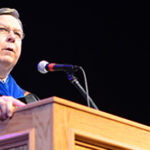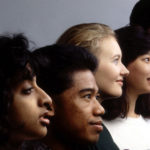ABILENE—During a two-week program at Hardin-Simmons University, representatives from nine countries learned how to welcome strangers by celebrating differences.
Participants from Uganda, the Democratic Republic of Congo, Bulgaria, Romania, Kosovo, Kyrgyzstan, Zimbabwe, Tajikistan and the United States gathered in Abilene July 14-27 to discuss hospitality and the stranger as part of an initiative HSU hosted in partnership with Communities Engaging with Difference and Religion.
“The way we conceptualize helping the other is often by making them like us,” said CEDAR Program Director David Montgomery.
No monopoly on suffering or truth
Montgomery shaped the group’s discussion by encouraging fellows—as the participants are called—not only to look for their similarities, but also to celebrate their differences. Leaders gave the fellows two guidelines.
“Do not act as though your community has a monopoly on suffering, and do not act as if they have a monopoly on truth,” he said.
The fellows used these rules as they discussed often divisive topics like immigration, race, evolution, homosexuality, gun control, politics and religion. In addition to lectures and discussion, the group learned Texas history as they traveled to Dallas and San Antonio where they visited the 6th Floor Museum, the Alamo and San Jose Mission National Park.
“If we know the past, we better understand the present, and we can envision a better future. We can say ‘never again’ to the injustices of the past,” said fellow Philippe Tunamsifu, professor and researcher in the African Center for Research on Peace Education and Development.
The group spent the majority of their time gaining a holistic view of Abilene, from a Baptist church to a Muslim prayer room and a creation museum to a non-profit. They also experienced Texas culture as they ate Tex-Mex and barbecue and went to a gun range and country-western dance hall.
People cannot be reduced to social categories
Throughout the cognitive and experiential learning program, the group formed relationships with each other. They began to see each other as more than their nationality, sexual orientation or political affiliation.
Sign up for our weekly edition and get all our headlines in your inbox on Thursdays
“No human being is reducible to their social category,” said fellow Rachel Schneider, a researcher and racial justice advocate in Houston.
While CEDAR has hosted more than 40 programs in 15 countries, this was their first two-week school in the United States.
Tom Copeland, professor of psychology and director of the Honors College at HSU, said the program gave him hope that reconciliation in a divided world is possible.
“I don’t want to be angry anymore,” Copeland said. “I want to do something that’s proactive and positive.”
Grace Mitchell is an English education major and staff writer for the university marketing office at Hardin-Simmons University.














We seek to connect God’s story and God’s people around the world. To learn more about God’s story, click here.
Send comments and feedback to Eric Black, our editor. For comments to be published, please specify “letter to the editor.” Maximum length for publication is 300 words.